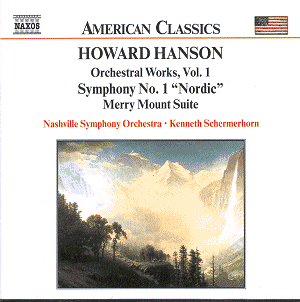Howard HANSON
(1896-1981)
Hanson Orchestral Works Vol. 1.
Symphony No. 1 Nordic (1922)
Merry Mount Suite (1938)
Pan and the Priest - symphonic poem (1926)
Rhythmic Variations on Two Ancient Hymns
 Nashville SO/Kenneth
Schermerhorn Nashville SO/Kenneth
Schermerhorn
rec Nashville April and Oct 1999
 NAXOS American Classics
8.559072 [60.56] NAXOS American Classics
8.559072 [60.56]
Crotchet
AmazonUS |
 |
Naxos's American Classics series launches out on another cycle. How delightful
too that they are signing up some of the less celebrated names among the
US orchestras. The Nashville do not have that ultimate finish you expect
from the Cadillac greats of North America but they deliver soulful and rounded
playing of pounding gravitas. The approach may, conceivably, be too
broad as is evident where sturdiness in the Nordic Symphony kicks
down to the point of stasis. There are times when you wish that the conductor
would light a fire and goad his players along. But when snappy convulsive
playing is specified the Nashville Symphony do respond. There are
some Sibelian hallmarks in the Symphony at 6.01 and 7.20 in the Allegro
con fuoco (gloriously vivacious flute playing). The work, anyway, lacks
the tenaciously tuneful grip of the Second Symphony Romantic but is
well worth experiencing for its grizzled atmosphere. Among the competition
it must give place to the Schwarz on Delos (now in a twofer as welcomed by
Ian Lace) and to the composer's version on Mercury (deleted). Oddly enough
Kenneth Montgomery/Jena Philharmonic on his frequently (and wrong-headedly)
overlooked Arte Nova coupling of symphonies 2 and 4 takes a rather languid
approach to No. 2 but there the broadness works superbly.
The suite from the Merry Mount opera is more successful, with
Schermerhorn building a ringing high-noon climax from the overture and passionate
release in the Love Duet. The Children's Dance and the syncopated
elements of the Prelude to Act II skip along like that memorable 'hick' dance
in the first movement of Walter Piston's irresistible Second Symphony (still
best heard in the DG Tilson-Thomas/Boston version). In the case of the Prelude
there are voices from Borodin (Igor Overture), Balakirev
(Tamar) and Mussorgsky (Great Gate of Kiev). The rustic
Maypole Dances lie between Vaughan Williams' greenswards and Stravinsky's
Easter Fair. However what we need, please, is a really good recording of
the complete opera. Given that Naxos has already issued the Lawrence
Tibbett 1930s premiere on discs (from distressed historical acetates) it
is too much to hope that Naxos American Classics will do the honours but
surely someone else can help. Merry Mount (always hampered by its
maladroit title, I thought) is well worth the trouble of revival. There has
been talk of a fine digital recording being touted from company to company.
I hope that its pilgrimage will end soon and that it will find a welcoming
taker ready to do it justice.
Pan and the Priest is a tone poem written during the years
between the First Symphony and the renowned Second. The collision between
sacred and profane, the life of devotion and the life of pleasure, saint
and sinner, is implicit in the title and explicit in the music. Its 14 minute
course takes an instinctive Sibelian approach. The saint and sinner line
is there for all to behold in the plot of Merry Mount and I suspect
these two extremes pulse through his music at different times. Take also
his tone poem Lux Aeterna which I rather hope will be on the next
volume in this sequence. Respighi's shaping is clear in this work with its
plainchant references alongside a brilliant orchestral palette. It does not,
however, have the memorable melodies of the First Symphony let alone of the
Second.
The recital ends with the comparatively sedate and severe Rhythmic
Variations on Two Ancient Hymns for string orchestra. The devotional
is to the fore. It stylistic companion would be the Hovhaness Armenian
Rhapsodies and, towards the end, the Elgar Introduction and Allegro
without the Elgar's lift and élan. The booklet notes that this
work was, until recently, thought to have been lost.
Not especially long playing time but a good start to the series.
Rob Barnett
See also review by John Phillips

